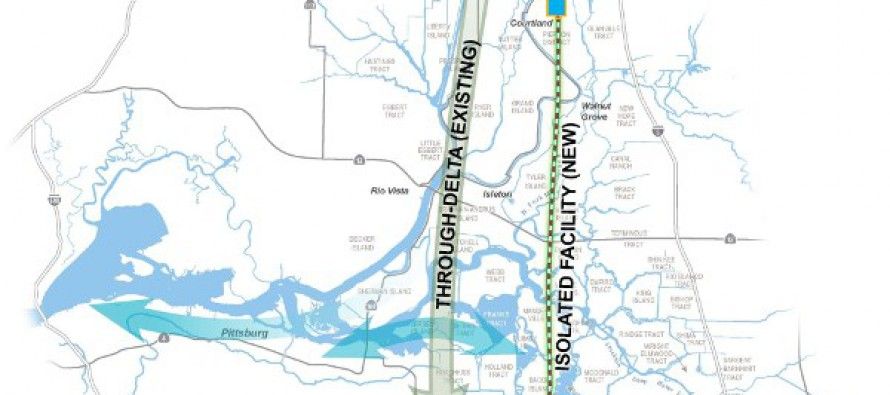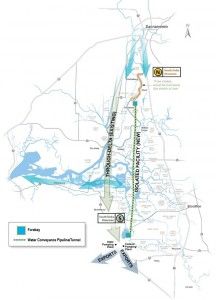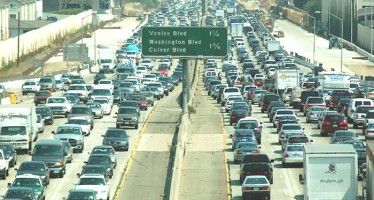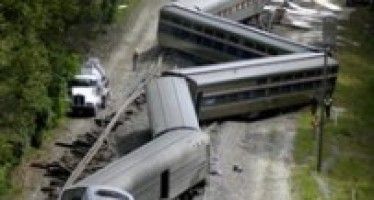2014 promises water fight over Delta tunnels

 Gov. Jerry Brown’s proposed twin tunnels under the California Delta will continue to be a major policy issue throughout 2014 and beyond. A spritzer of things to come is a recent article in the Daily News by Conner Everts and Adam Scow, “Gov. Brown’s twin-tunnel project undermines L.A.’s water future.”
Gov. Jerry Brown’s proposed twin tunnels under the California Delta will continue to be a major policy issue throughout 2014 and beyond. A spritzer of things to come is a recent article in the Daily News by Conner Everts and Adam Scow, “Gov. Brown’s twin-tunnel project undermines L.A.’s water future.”
Everts is executive director of Southern California Watershed Alliance; Scow is California director for the consumer advocacy nonprofit Food & Water Watch.
Given how much state water policy affects Los Angeles — and the rest of Southern California — it makes sense for residents there to pay attention to what’s going on.
The authors write, “An independent cost estimate found that water bills and property taxes for Angelenos would need to rise by $2,000 to $4,500 per household over 40 years in order to fund Los Angeles Department of Water and Power’s $1.5-$5 billion cost-share of the project.”
Cost
A different estimate comes from the Metropolitan Water District, which pegs the cost of the tunnels at $5 to $6 per household per month.
Moreover, the cost of the tunnels would not be carried only by the City of Los Angeles. Rather, the cost would be spread over all of Southern California water ratepayers in six counties as well as Central Valley farmers. Northern California would only pay for re-engineering the Delta ecosystem for fish. Most Northern cities would pay nothing for the tunnels.
Everts and Scow write that there could be cheaper options than the tunnels. Yes, but environmental organizations have opposed less costly alternatives. For example, co-author Scow’s Food and Water Watch nonprofit lobbying organization is on record opposing the cheaper Peripheral Canal, an older proposal for a surface canal skirting the Delta instead of running through and under, as would the tunnels.
The $3.2 billion Peripheral Canal Act was proposed in 1982 during the last year of Brown’s first stint as governor. (That would be about $6 billion in 2014 dollars.) As Proposition 9 on the June ballot that year, voters sank it by a vote of 63 percent against, 37 percent for.
Water flows
The Delta tunnels actually would be quite different. They would convey water North-to-South underneath the Delta to southerly farms and cities. In doing so, East-West surface water flows for fish migration could be restored. And a subsurface tunnel would not have to take or sever Delta farmlands.
One way to think of the Delta tunnels is as proxy property rights. The Delta Tunnels would provide separate water conveyance systems for cities, farms and fish. Building separate water conveyance systems would lessen California’s water wars.
Cities, farmers and environmentalists would not own separate parts of the State Water Project. But there would be less co-mingling of the same water resources. This would overcome what is called “the Tragedy of the Commons,” whereby groups trying to reap the greatest benefit from a pooled resource such as the Delta overwhelm the supply and degrade the resource.
Bonds
The Delta tunnels proposal also enters the flow of state water bonds. Since 2000, California voters have approved five water bonds totaling $15.4 billion, but have almost nothing to show for it. The bond revenues mainly went for open space acquisitions and landscaping projects around upscale Northern California communities.
Now, after having been postponed twice, an $11 billion water bond is scheduled to be on the Nov. 2014 ballot. The postponements came from the Legislature, which initially had put the measure on the ballots in 2010 and 2012, after allegations that the initiative was larded with pork.
The Legislature could change the nature and specifics of the bond before it goes on the November ballot. Until then, the current version already garnered support and opposition. Supporting players have included the Chamber of Commerce and Meg Whitman, the 2010 Republican candidate for governor. Opposing it have been Sierra Club California and the United Farm Workers.
The ancient Greek philosopher Heraclitus said you can’t step into the same river twice. But California will continue to grapple with water policy not only twice, but many times.
Related Articles
Are Split Rolls Coming Soon?
NOV. 16, 2010 By KATY GRIMES The recent passage of Proposition 25, which allows legislators to pass a budget with
Carpooling and mass transit decline; number of solo commuters on the rise
If you drive to work alone then you are not, well — alone — in a manner of speaking. It seems
Brown pleads to CA Supreme Court: Please kill bullet train ASAP!
On Friday night, the Sacramento Bee reported a bullet-train development that looks off the wall if you follow the MSM




